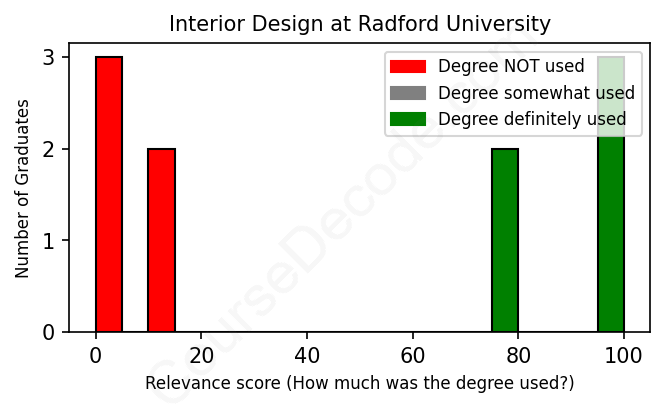
First, some facts. Of the Interior Design graduates from Radford University we've analyzed , here's how many have used (or NOT used) their degree in their career:

These are estimates based on AI analysis of 10 LinkedIn profiles (see below).
The verdict? Significantly below average. Overall, with an average relevance score of 47%, Interior Design graduates from Radford University have a much lower likelihood (-20%) of finding work in this field compared to the average graduate across all fields:
And for comparison, here's the chart for all profiles we've looked at across all degrees.
Also, after graduating, only 0% of these graduates have pursued further education other than another Bachelor's degree (such as a Masters degree or other), compared to the average across all profiles of 35%. This suggests a Bachelors degree is enough for most Interior Design graduates, and it's normal to look for work straight after graduation.
See the details:
|
Relevance score: 3% We think this person has NOT gone into a career related to their degree. We think this person has NOT gone into a career related to their degree.
DEGREE INFOGraduated in 2022 from Radford University with a Bachelor's degree in Interior Design. No other secondary education since. JOB HISTORY SINCE GRADUATIONOvernight Stocker Walmart Jul 2022 - Nov 2022 Kiosk Sales Promoter  Vacation Village Resorts May 2023 - Jul 2023 Service Manager  Chipotle Mexican Grill Oct 2022 - Present ABOUTNo information provided. |
The top 10 most common jobs done by the graduates we've analyzed (ranked most common to least) are:
After checking out the job profiles of people who graduated with an Interior Design degree from Radford University, it seems like the most common types of jobs are heavily skewed towards roles that are not directly related to interior design. A fair number of graduates end up in positions like customer service, real estate, and even special education, which don't really make use of the skills or knowledge that come from an Interior Design education. Even roles like marketing or project management, while they may require some creativity, don’t truly dive into the core principles of design that students work hard to learn in their courses.
On the flip side, there are definitely graduates who did find positions that are directly relevant to their field, such as working as interior designers or design associates. However, these relevant roles appear to be somewhat less common compared to the number of graduates taking on jobs in completely unrelated fields. It does seem like some grads might struggle to land a design-specific job right away, which could be a bit frustrating given the time and effort put into their studies. Overall, while there are some success stories in the design world, many graduates seem to branch out into various other careers that don’t quite align with what they learned.
Here is a visual representation of the most common words in job titles for Interior Design graduates (this is across all Interior Design graduates we've analyzed, not just those who went to Radford University):

When looking at the career paths of graduates from Radford University's Interior Design program, it seems like there’s a pretty mixed bag. A lot of students land their first jobs related to their field, such as internships or entry-level positions in design firms. For instance, graduates from 2012 got internships and then moved up to certified interior designer roles, while others had rapid advancements at the same firm. This suggests a strong foundation in interior design that many utilize right out of school. However, not all paths are so straightforward—some graduates have found themselves in completely different industries after a few years, like taking roles in real estate or even customer service, which don’t seem closely tied to their degree.
If we fast forward five to ten years post-graduation, some alumni really hit their stride in the design sector, climbing the ranks and securing impressive titles like Associate Principal Designer or Project Manager. On the flip side, others drift away from design-related jobs entirely, landing in fields that may not relate to what they studied at all. It’s clear that while many graduates do stick with interior design and find success, others struggle to stay in a creative career. So, if you’re thinking of pursuing this path, it’s vital to not only network but also be open to various roles to keep your career moving in the right direction!
Hey! So, when it comes to a Bachelor’s degree in Interior Design at Radford University—or really anywhere, to be honest—it can be a bit of a mixed bag. On one hand, if you’ve got a creative flair and love working with colors, spaces, and layouts, you might find the coursework exciting and enjoyable. But be prepared; it’s definitely not a walk in the park! You’ll need to juggle design projects, critiques, and a lot of technical skills in software and drafting. The workload can be pretty heavy at times, especially when you have deadlines looming. Overall, it’s not the easiest degree out there, but if you're passionate about design, it can be super rewarding! Just know that it will take some hard work and dedication.
Most commonly, in the LinkedIn profiles we've looked at, it takes people 4 years to finish a Bachelor degree in Interior Design.
Looking at these Radford University Interior Design grads, it seems like they've had a mixed bag when it comes to making decent money. The ones who graduated in, say, 2012 and earlier seem to have climbed the ladder pretty nicely, especially those in established firms or in managerial positions—they're likely doing well. But some of the more recent grads, especially those from 2022, are juggling entry-level jobs or roles that don’t seem all that lucrative yet, like retail and service positions. It’s clear that with experience, their earning potential can really improve, but right now, a few might still be living paycheck to paycheck, figuring things out in their careers. Overall, it’s a game of patience and persistence in this field!
Here is a visual representation of the most common words seen in the "about" section of LinkedIn profiles who have a Bachelor degree in Interior Design (this is across all Interior Design graduates we've analyzed, not just those who went to Radford University). This may or may not be useful:

Here are all colleges offering a Bachelor degree in Interior Design (ordered by the average relevance score of their Interior Design graduates, best to worst) where we have analyzed at least 10 of their graduates:
| College | Score | Count |
|---|---|---|
 Fashion Institute of Technology Fashion Institute of Technology
|
93 | 12 |
 University of Nebraska-Lincoln University of Nebraska-Lincoln
|
92 | 16 |
 Kent State University Kent State University
|
90 | 13 |
 Savannah College of Art and Design Savannah College of Art and Design
|
89 | 21 |
 Design Institute of San Diego Design Institute of San Diego
|
89 | 10 |
 Iowa State University Iowa State University
|
86 | 13 |
 Pratt Institute Pratt Institute
|
83 | 11 |
 Cazenovia College Cazenovia College
|
79 | 15 |
 Purdue University Purdue University
|
74 | 11 |
 The Art Institutes The Art Institutes
|
74 | 20 |
 San Francisco State University San Francisco State University
|
73 | 10 |
 East Carolina University East Carolina University
|
70 | 10 |
 Harrington College of Design Harrington College of Design
|
70 | 14 |
 Texas State University Texas State University
|
67 | 11 |
 Radford University Radford University
|
47 | 10 |